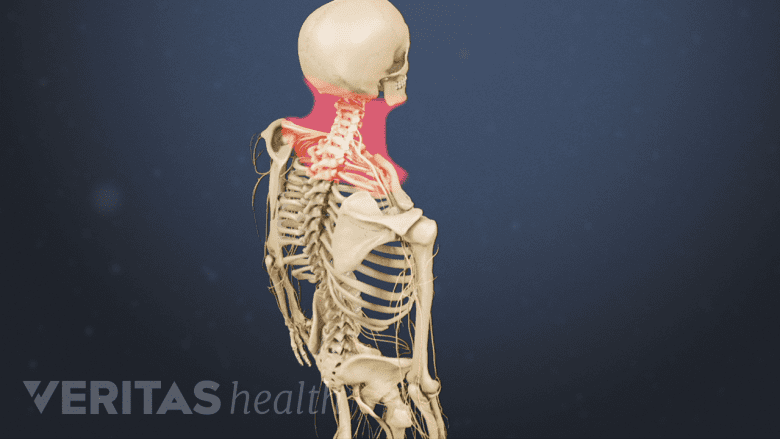Most cases of neck pain and stiffness start to get better within a few days, but sometimes the symptoms become chronic and last much longer or keep coming back. In addition to lifestyle changes, most treatment plans for chronic stiff neck involve a combination of treatments that focus on reducing pain and increasing the neck’s range of motion.
Neck pain and stiffness that persists can cause numerous challenges, such as a constant achiness that interferes with concentration and/or sleep, reduced range of motion that limits head movements, painful flare-ups that can be debilitating, and/or a fear of doing something that might make the symptoms even worse. Specific treatments may depend on what is causing the chronic stiff neck, as well as what the patient perceives to offer the most relief.
In This Article:
Treatment Options for Chronic Stiff Neck
Treating chronic stiff neck typically requires a long-term commitment of trying different treatments and learning what does and does not help. Some treatments might only be needed on a temporary basis or for occasional flare-ups, whereas other treatments might be incorporated on a more regular basis.
One or more of the following treatments are commonly used:
Self-care

Ice and heat therapy are effective self-care treatments for chronic neck stiffness.
When a stiff neck returns or flares up, some initial treatments can be applied at home. Some examples include applying an ice pack or heat pack, gentle range-of-motion stretches, self-massage, or over-the-counter pain medications. Movements that can be done pain-free or with minimal discomfort are encouraged to keep the neck’s joints and muscles active and to prevent further tightening. In addition, movements or activities that worsen neck pain are to be avoided.
See Self-Care for Chronic Stiff Neck
Lifestyle changes
Sitting with a supported posture prevents muscle and ligament pain in the neck.
Daily habits and the surrounding environment can play roles in how much the structures of the cervical spine are routinely stressed or overworked. Making lifestyle changes—such as using good posture when sitting, using a headset for the phone, becoming more physically active, or finding a better sleep position or pillow may help reduce factors that are contributing to neck pain and stiffness.
See Lifestyle Changes to Treat Chronic Stiff Neck
Spinal manipulation and mobilization

Manual manipulation involves applying thrusts to move the joint beyond its range of motion.
Manual manipulation, also called adjustments, can be applied to the cervical spine’s joints by a trained professional, such as a chiropractor, physical therapist or doctor of osteopathic medicine (D.O.). The goals are to increase range of motion and provide pain relief. Two of the more common types include high-velocity, low-amplitude manipulations, which involve applying thrusts with the hands to move the joint beyond its normal range of motion; and various techniques for spinal mobilization, which are more gentle manipulations that do not move the joint past its normal range of motion.
See Manual Manipulation and Mobilization for Chronic Stiff Neck
Massage therapy
A massage applied to the soft tissues of the neck by a trained professional, such as a physical therapist or massage therapist. It may help warm up, stretch, and relax muscles that have been tight or in spasm.
See Massage Therapy for Chronic Stiff Neck
Acupuncture
In traditional Chinese medicine, acupuncture is linked to the belief that disease is caused by disruptions to the flow of energy, or qi, in the body. This treatment involves having a licensed acupuncturist place tiny needles in various areas of the body in an effort to get qi to flow more freely, with the goal of promoting relaxation and pain relief.
See Acupuncture for Chronic Stiff Neck
Numerous other treatments are available for chronic neck pain and stiffness. Surgery is typically not considered for neck pain and stiffness unless it is accompanied by cervical radiculopathy (such as pain, tingling, numbness, and/or weakness that radiates into the arm or hand) or cervical myelopathy (such as problems with coordination or bowel/bladder control).
Common Causes of Chronic Stiff Neck

Cervical spondylosis is a cause of pain and stiffness in the neck.
Understanding what is causing chronic neck stiffness can aid in developing a treatment plan. Some of the more common causes of a stiff neck lingering and/or returning include:
Cervical spondylosis. Any type of degeneration of the cervical spine’s discs or joints, called cervical spondylosis, can lead to inflammation and instability. Pain and stiffness can result from swelling and/or nearby muscle spasms. Some examples include cervical osteoarthritis or cervical degenerative disc disease, such as a bulging or herniated disc.
Poor posture. Regularly sitting for hours a day with the shoulders hunched forward can potentially lead to a deconditioning of neck and back muscles, as well as excessive stress on the cervical spine.
Other underlying chronic conditions. Various conditions are capable of contributing to pain and stiffness in the neck. The exact mechanisms of pain in some of these conditions, such as fibromyalgia, are not yet completely understood but ongoing research is progressing.
Other causes of chronic stiff neck are also possible. Before starting a treatment plan for chronic neck stiffness, it is important to visit a doctor who can screen for potentially serious underlying causes, such as cervical spine instability, infection, spinal cord or nerve compression, or cancer.
Read more about Treatment for a Stiff Neck


